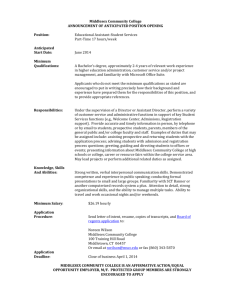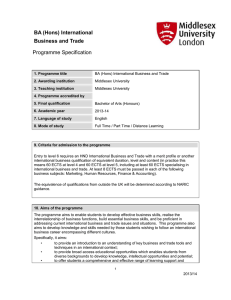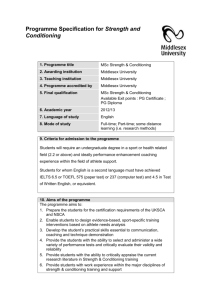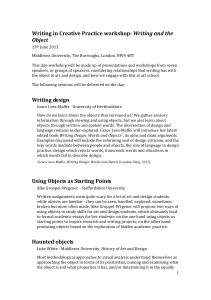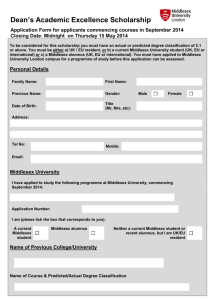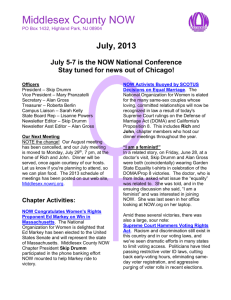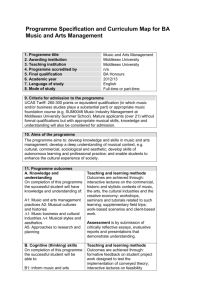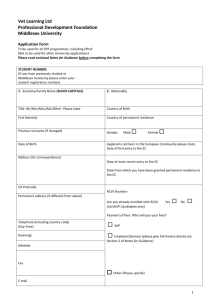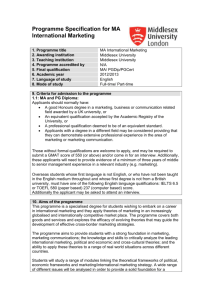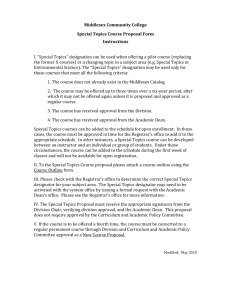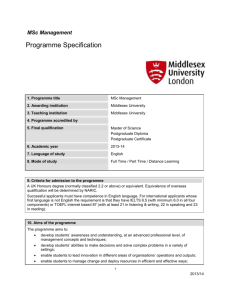Advanced Diploma for Management Studies
advertisement
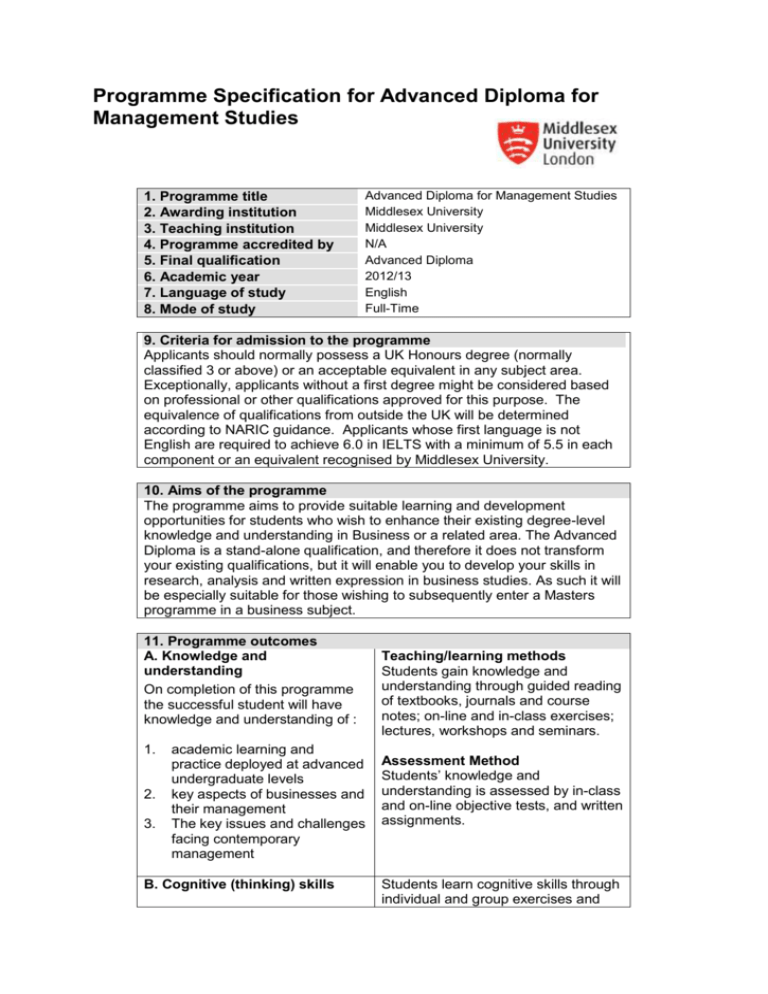
Programme Specification for Advanced Diploma for Management Studies 1. Programme title 2. Awarding institution 3. Teaching institution 4. Programme accredited by 5. Final qualification 6. Academic year 7. Language of study 8. Mode of study Advanced Diploma for Management Studies Middlesex University Middlesex University N/A Advanced Diploma 2012/13 English Full-Time 9. Criteria for admission to the programme Applicants should normally possess a UK Honours degree (normally classified 3 or above) or an acceptable equivalent in any subject area. Exceptionally, applicants without a first degree might be considered based on professional or other qualifications approved for this purpose. The equivalence of qualifications from outside the UK will be determined according to NARIC guidance. Applicants whose first language is not English are required to achieve 6.0 in IELTS with a minimum of 5.5 in each component or an equivalent recognised by Middlesex University. 10. Aims of the programme The programme aims to provide suitable learning and development opportunities for students who wish to enhance their existing degree-level knowledge and understanding in Business or a related area. The Advanced Diploma is a stand-alone qualification, and therefore it does not transform your existing qualifications, but it will enable you to develop your skills in research, analysis and written expression in business studies. As such it will be especially suitable for those wishing to subsequently enter a Masters programme in a business subject. 11. Programme outcomes A. Knowledge and understanding On completion of this programme the successful student will have knowledge and understanding of : 1. 2. 3. academic learning and practice deployed at advanced undergraduate levels key aspects of businesses and their management The key issues and challenges facing contemporary management B. Cognitive (thinking) skills Teaching/learning methods Students gain knowledge and understanding through guided reading of textbooks, journals and course notes; on-line and in-class exercises; lectures, workshops and seminars. Assessment Method Students’ knowledge and understanding is assessed by in-class and on-line objective tests, and written assignments. Students learn cognitive skills through individual and group exercises and On completion of this programme the successful student will be able to: 1. 2. 3. 4. apply management concepts, models and theories to analyse situations; identify, evaluate, construct and present arguments; demonstrate self awareness and sensitivity to others; take and defend a decision or position on a given business issue, considering a wide range of relevant factors. C. Practical skills On completion of the programme the successful student will be able to: 1. 2. 3. locate, categorise, prioritise, and synthesise information necessary for business purposes; select and apply key management concepts to appropriate business situations; identify and demonstrate verbal and written communication skills appropriate to a given business situation. D. Graduate Skills On completion of the programme the successful student will be able to: 1. 2. 3. 4. 5. clarify career objectives & develop plans to achieve them; learn flexibly and effectively from diverse opportunities; communicate persuasively using a range of media; contribute positively to team performance; use ICT to improve personal productivity case; tutor-led seminars and class discussions. Feedback on assessments. Assessment Method Students’ cognitive skills are assessed by essays, and oral presentations, sometimes based on case analysis. Teaching/learning methods Students learn practical skills through workshops, simulations, role-plays, individual and group case analysis and problem solving. Assessment Method Students’ practical skills are assessed by individual and group exercises, and individual assignments. Teaching/learning methods Students learn cognitive skills through on-line exercises and embedded class activities embedded in level one modules. Subsequently, tutorial guidance and feedback on assessment is deployed. Assessment Method Students’ cognitive skills are assessed by highlighting graduate skills within assessments for relevant modules. Career plans are developed as part of an on-line PDP, but given their idiosyncratic nature are not subject to summative assessment. 12. Programme structure (levels, modules, credits and progression requirements) 12. 1 Overall structure of the programme See page 10 12.2 Levels and modules Starting in academic year 2010/11 the University is changing the way it references modules to state the level of study in which these are delivered. This is to comply with the national Framework for Higher Education Qualifications. This implementation will be a gradual process whilst records are updated. Therefore the old coding is bracketed below. Level 6 (3) COMPULSORY OPTIONAL PROGRESSION REQUIREMENTS Students must take all of the following: MGT3402 MGT3403 12.3 Non-compensatable modules (note statement in 12.2 regarding FHEQ levels) Module level Module code 3 MGT3402, MGT3403 13. A curriculum map relating learning outcomes to modules See Curriculum Map attached 14. Information about assessment regulations Middlesex University and Business School Assessment Regulations apply to this programme, without exception. 15. Placement opportunities, requirements and support (if applicable) Placement is not available on this programme. 16. Future careers (if applicable) Middlesex University Business School graduates experience higher average rates of employment than Middlesex University graduates as a whole. The University provides a Career Service, and this programme includes scheduled career planning sessions. Students who attain a pass in both modules equivalent to the standard of a second class degree (grade 12 or better on the University’s 20-point scale) will be eligible to apply for a Masters programme in Business and/or Management. Successful achievement of the programme may also be suitable to support student’s application for employment. 17. Particular support for learning (if applicable) In addition to Middlesex University’s campus student advisers, learning resources staff and counsellors, there are some forms of support particularly relevant to this programme: programme induction; English language and numeracy support; exam technique classes; programme web-site and online discussion board. Middlesex University is committed to breaking down any barriers which might prevent a disabled person from actively participating in the academic life. This extends to the provision of learning support and support in relation to assessment for people with disabilities. 18. JACS code (or other relevant coding system) 19. Relevant QAA subject benchmark group(s) N100 General Business and Management 20. Reference points QAA Guidelines for Programme Specifications QAA Subject Benchmark: General Business & Management Middlesex University Regulations Middlesex University Learning Framework – Programme Design Guidance, 2007 Middlesex University Learning & Quality Enhancement Handbook, Middlesex University Teaching, Learning & Assessment Strategy Please note programme specifications provide a concise summary of the main features of the programme and the learning outcomes that a typical student might reasonably be expected to achieve if s/he takes full advantage of the learning opportunities that are provided. More detailed information about the programme can be found in the student programme handbook and the University Regulations.
